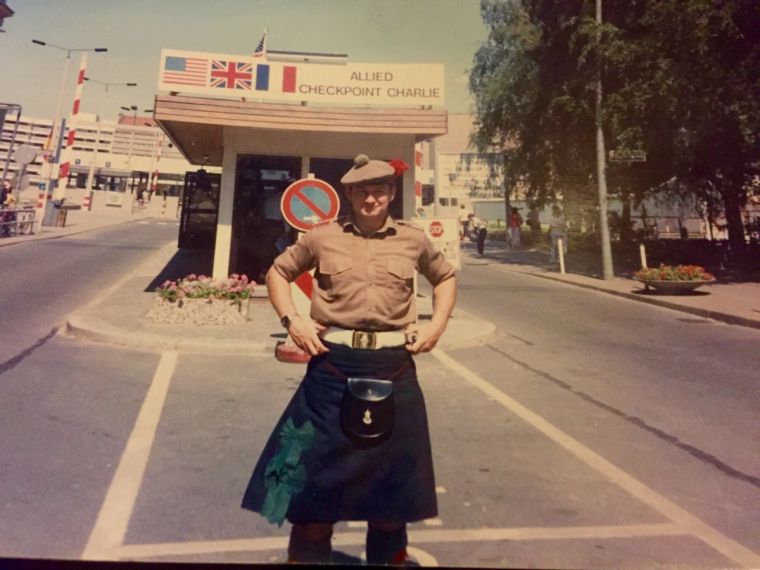Church minister who used to guard Berlin Wall says collapse was a 'triumph'

Today Peter Sutton is a minister in the Church of Scotland but 30 years ago he was a soldier patrolling one of the most famous checkpoints in history - Checkpoint Charlie.
The concrete barrier represented both the physical and ideological division of Berlin - and Germany - separating the west of the city from the east between 1961 and 1989.
Saturday marked the 30th anniversary of the collapse of the wall that was despised by so many Germans on both sides, a feat that many in the country had feared would never happen.
Rev Sutton used to sleep just yards away from the Wall while serving as a guard at the checkpoint.
The former platoon commander with the 1st Battalion Black Watch was responsible for the 30 men whose job it was to protect the British sector of Berlin up.
"I really enjoyed my tour in West Berlin because it was an exciting, vibrant place to be," he said.
"Our role was to ensure that the Russians did not take over the city and make it part of East Germany.
"It was a city full of 'spies' and an exciting posting everyone wanted because historically it linked you back to all those War films and commando comics we had grown up with.
"I was stationed there until a few months before the Wall fell and although Berlin did not feel dangerous per se, people were still being shot if they came over it.
"You would not climb over it for a joke."
The Wall was erected by the German Democratic Republic in 1961 to stop the mass defections to the West.
It ran just behind the base where Rev Sutton was stationed, although one barrack in the compound was not allowed to house British soldiers because it was technically in the Russian sector of the city.
"Visitors would stay in the officers mess and we would go to the Wall with them and chip off a bit of it for them to keep as a souvenir," he added.
Rev Sutton, who two years earlier was a guard at Berlin's Spandau Prison where Adolf Hitler's deputy, Rudolph Hess was held, remembered making frequent trips to East Berlin and finding it a very different place from the West.
"It was a different world with a different mindset and was like going back in time by 30 years," he recalled.
"It was grey and drab, nothing really had been repaired and you came back with a splitting headache because of all the fumes from the fuel used in Trabant cars.
"I speak a little German and I remember one time when I was in my uniform a little girl pointed at my kilt and asked her mother 'why is that man wearing a skirt?'
"She couldn't explain because she did not know what Scotland was or anything about our national dress.
"It was not part of how they were educated."
He remembers a Russian officer hinting to him that things were about to change in Germany.
"There was a British military train that connected Berlin to West Germany and travelled through the iron corridor and my job as train officer was to present passports for inspection," he said.
"I was chatting with the inspecting Russian officer and asked him if he thought we would be doing this in 20 years' time and he said 'I think there are about to be big changes' and a couple of months later the Wall came down."
Just a few months before the Wall was pulled down, Rev Sutton was reposted to South Armagh in Northern Ireland.
He recalls watching the dramatic events unfold in an army patrol base there, and finding it to be a "great moment of celebration" but also "quite poignant".
"We sat there and thought, if they can tear down barriers in Europe, what on earth is going on in Northern Ireland where communities are divided and we are surrounded by huge breeze block walls and in constant danger?" he said.
Rev Sutton is now 54 and the minister of St Cuthbert's Parish Church in Edinburgh.
He continued: "For me, the fall of the Berlin Wall symbolised triumph and hope over potential disaster, a bit like that piece of beautiful music, Beethoven's Ode to Joy.
"Watching it come down was a joyful moment and historically, if you were to follow the pattern of the Cold War it should have ended in mutually assured destruction."
The father of five thinks there are lessons that can be learned from history for Brexit Britain today.
"People realised that was not the way to go and it was much better to tear down barriers and make it open and possible for people to engage and travel amongst each other," he said.
"But here we are on the cusp of leaving the European Union and I think barriers are being built again which is very sad, particularly in the case of Northern Ireland which has paid a heavy price for peace and reconciliation.
"For today's political class, which on the whole never really got involved in the Cold War or the Troubles in Northern Ireland, to put that in jeopardy for their own ends is incredibly disingenuous and disrespectful."











